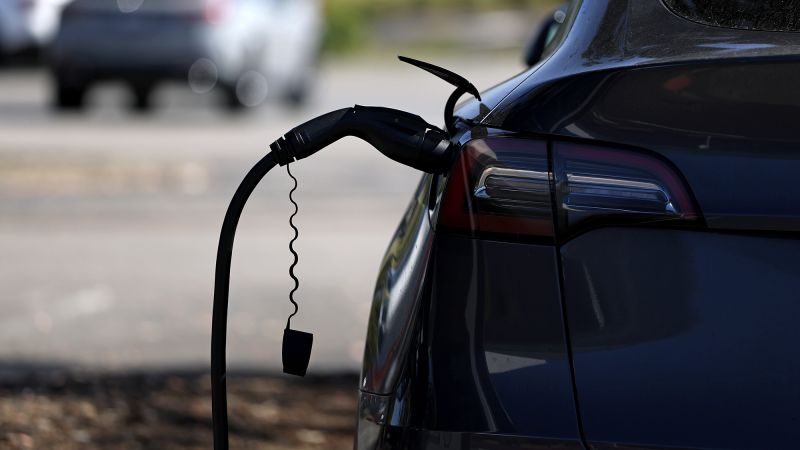A version of this story will appear in CNN Business’ Nightcap newsletter. To get it in your inbox, sign up for free here.
New York
—
Two years ago, as President Donald Trump was running for reelection, he derided President Joe Biden’s electric vehicle push as a “hoax” promoted by “Radical Left Fascists, Marxists & Communists.”
“Within 3 years, all of these cars will be made in China,” he wrote on social media at the time.
That last jab now reads as more of a promise than a prediction.
Since returning to office, Trump and congressional Republicans have upended the landscape for electric vehicle development in America, yanking the $7,500 tax incentives that helped entice car buyers, freezing funding for charging infrastructure development and eliminating fuel-efficiency targets for automakers.
The result: The US is retreating on EVs just as China, its No. 1 economic rival, is going full steam ahead, cementing its dominance over not only global EV sales but also the supply chains for batteries and critical rare-earth minerals used in their production.
In a political context, Trump’s anti-EV position isn’t hard to understand — Republicans have long opposed Democratic-led incentives like the EV tax credit in part because they’re seen as a threat to the oil and gas industry. But in the context of Trump’s trade war with China, the logic of retreating from EVs is harder to square.
And that’s because the Biden-era incentives were, in large part, about China, too, with provisions to incentivize American battery factories and penalties for companies that didn’t build enough in the US.
By that logic, Trump should have gone even further to push American automakers and consumers embrace EVs. When asked about the apparent contradiction, a White House spokesperson said that Trump is “restoring America’s energy and manufacturing dominance by rolling back burdensome regulations that stifled the energy industry and reshoring jobs” as part of the administration’s “commitment to ensure American automakers play a key role in America’s next Golden Age.”
Consider that when it comes to virtually every other product in the world, Trump has made clear he wants everything — from basic widgets to pharmaceuticals to artificial intelligence and the chips that power it — made on American soil. He has no qualms, as his GOP predecessors would have, with the federal government directly intervening in Corporate America to try to prop up strategically significant industries, like semiconductors.
Trump has even orchestrated a deal for TikTok, the Chinese-owned video-sharing social media app, to cleave off its US assets and transfer ownership to a group of American investors — all based on the theory that TikTok’s connection to Beijing represents potential national security concerns.
So it would make some sense that Trump would be doing everything he could to build electric cars in the US – especially since many experts still maintain that we’re closer to the end for gasoline-powered cars than the beginning.
“The writing is on the wall for gasoline, and to cede EV technology to China is a massive mistake,” Huibert Mees, a retired automotive engineer who’s worked for the likes of Tesla, Lucid and Apple, told me. “I think it’s a massive national security risk, because it is the future of transportation.”
“Do we want that dominated by the Chinese or anyone else?” Mees asked. “We are supposed to be the ones who develop the new things, and we’re walking away from the new thing.”
American carmakers haven’t completely given up on EVs, but the enthusiasm is decidedly waning as sales are expected to fall off a cliff after the $7,500 tax credit expired on September 30.
-
General Motors on Tuesday said its earnings next week would include a $1.6 billion loss related to its pullback on EV production — a “strategic realignment” in response to government policy changes.
-
Ford has scrapped or delayed some electric models, and its EV division has lost more than $2 billion in the first half of this year, according to the New York Times.
-
Stellantis, the conglomerate that owns Jeep, Ram Chrysler and Dodge, has also scaled back its EV ambitions in the US market.
-
Honda recently ended US production of the Acura ZDX electric crossover.
-
Even Tesla, the American EV pioneer, has a rapidly aging lineup and a CEO who said earlier this year that the company is now more focused on AI and robotics than cars.
It’s not just Trump’s EV-specific rollbacks complicating things for the automakers. Since May, car companies have been largely absorbing the cost of Trump’s tariffs, which put a 25% tax on most imported cars and parts, to avoid raising prices for consumers.
And it’s that broader industry instability that is forcing automakers to pull back, Erin Keating, executive analyst at Cox Automotive, said in an interview.
“On some level, some of this pulling back, from an automaker perspective, is because there’s just so much uncertainty,” Keating said. Given the complexity of the industry as a whole, the relatively small (and largely unprofitable) EV sector is “an obvious place for automakers to dial back production and try to save some costs while they figure out everything else.”
Meanwhile, Chinese EV makers like BYD and Geely are making a huge push into overseas markets. Those brands may not mean much to Americans because of longstanding trade barriers, but they are popular (and notably affordable) options in markets from East Asia to Europe and South America.
“It wasn’t that long ago that Chinese cars would just would basically obliterate themselves in a crash test,” said Mees, who is also a contributor to the Autopian, a car news website. “Now they’re leading, and it hasn’t taken that long — they’re going at breakneck speed, and they’re not slowing down.”


